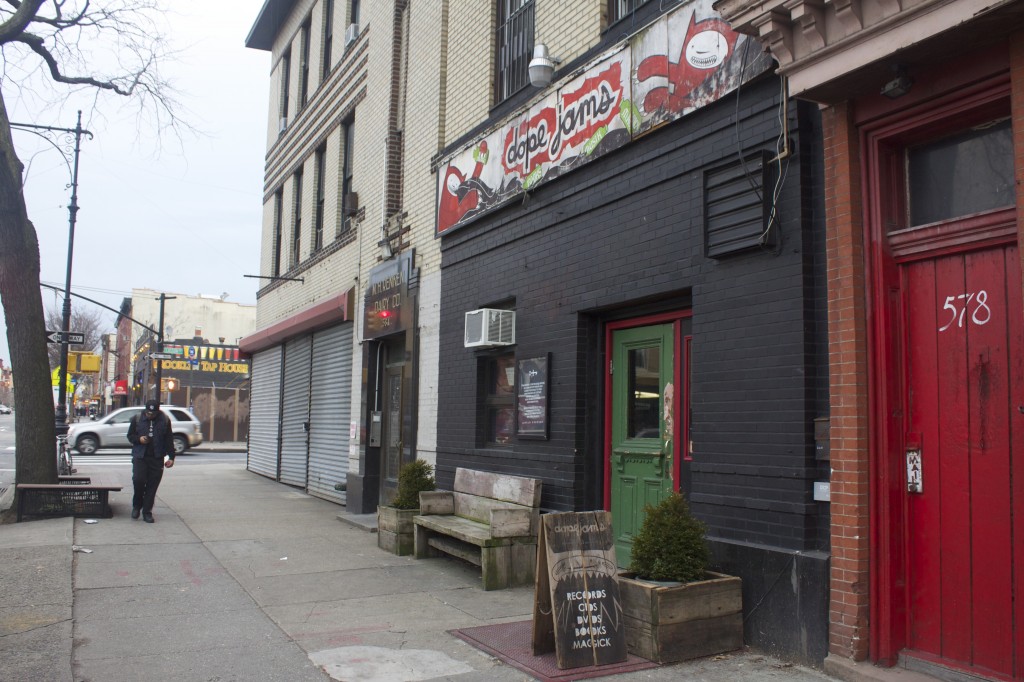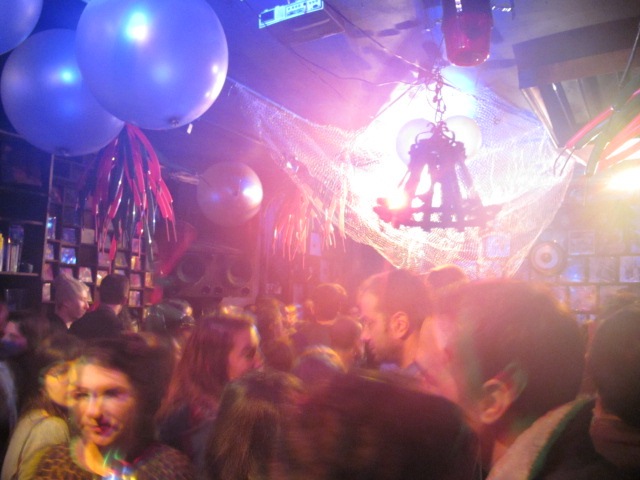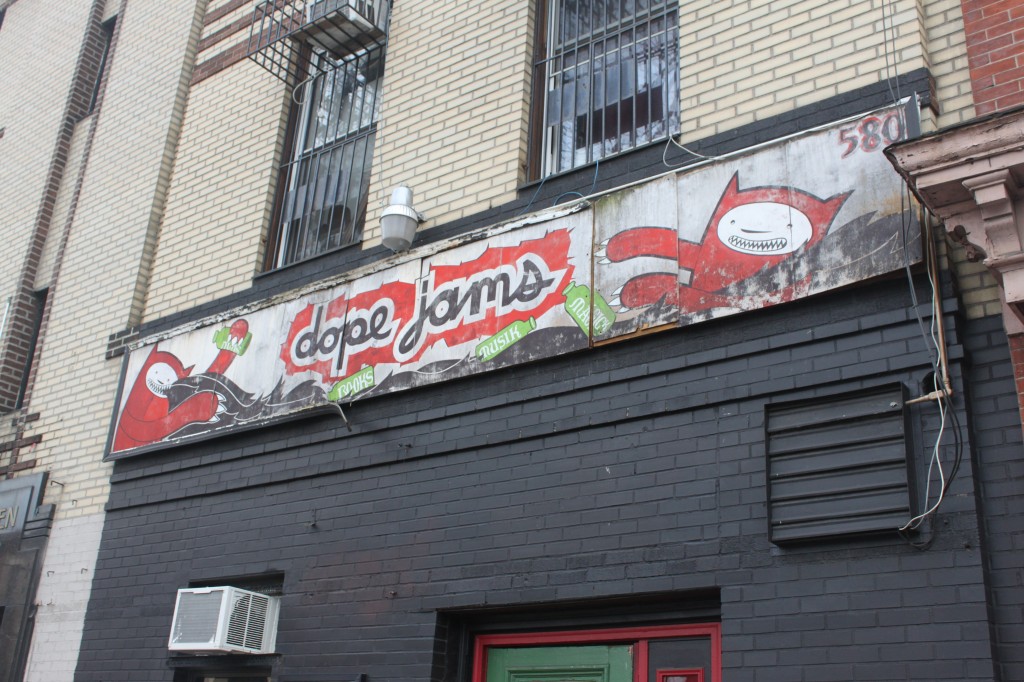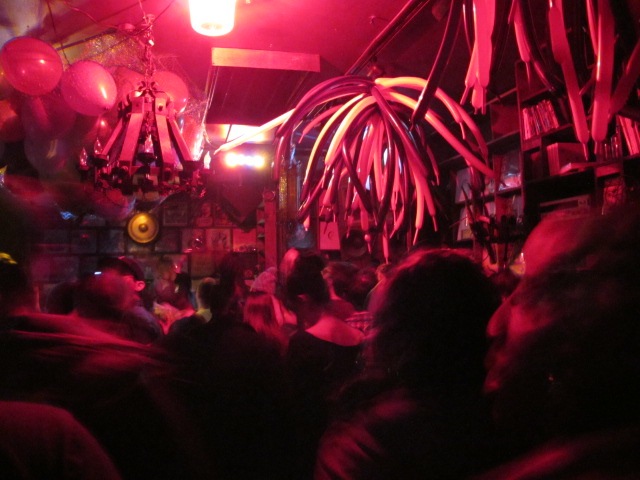
Dope Jams, a former record and music culture shop at 580 Myrtle Avenue, in mid-January. Co-owners Francis Englehardt and Paul Nickerson decided to close the store-front after a rent increase. (Philippe Theise)
Clinton Hill’s Dope Jams, a record store specializing in underground dance music, closed its storefront at 580 Myrtle Avenue in the wee hours of Sunday, Jan. 27 after a seven-year run and an epic party. In recent conversations, co-owner Francis Englehardt, employee Randy Delgado, and several customers and partygoers described the shop as a community-oriented space within a shifting neighborhood.
“It was this weird little area”
On a mid-January afternoon in his shop, Englehardt, 36, sat near a worn orange sofa and packed purchased records for shipment. A stack of vinyl covered part of the front counter — Rockwell’s 80s hit, “Somebody’s Watching Me,” was on top — and employees played tracks from the elevated deejay booth in the back of the store.
Nothing of the scene suggested what Englehardt and co-owner Paul Nickerson had already revealed online: due to a rent increase, Dope Jams would become an online-only shop after its closing fete. While handling the orders, Englehardt talked about the changes he has seen on the Clinton Hill and Bedford Stuyvesant border, as well as in the retail music world, since opening in January 2006.
“It was this weird little area. It wasn’t Park Slope, it wasn’t Williamsburg,” he said of the neighborhood near the Brooklyn-Queens Expressway and Pratt Institute that attracted him back in 2005. “It hadn’t quite been gentrified yet. The neighbors still knew each other.”
The lack of what he described as Williamsburg’s “gloss” appealed to him. “We just wanted to go to a place where we could be ourselves.”
Approaching 580 Myrtle from Pratt in 2013, it’s easy to see that the avenue has changed. Just across Classon Avenue, the 1-year-old Brooklyn Tap House has a large mural that depicts the borough’s eponymous bridge. Across Myrtle, Brooklyn Bird, which opened in December, serves chicken wings, fish tacos and sandwiches. Meanwhile, metal grates cover the old location of Wally’s Square Root Café, an eclectic restaurant that closed last fall.
Englehardt said that the economics of vinyl has changed, too. That afternoon, the Rockwell record sold for $3.99, and there were still bargain bins underneath the regular stacks in the shop. But in 2013, Dope Jams sold new vinyl for $15 to $30, compared to $8 to $12 in 2006. A record “has become a luxury item” for the consumer, Englehardt said.
While retail prices climbed, the business’s slim profit margin remained constant. Englehardt pays $11 or $12 for a record that sold in the shop for $15, about a 20% to 30% markup. Dope Jams, he said, never made sense financially as a storefront; staying open depended on income from events such as onsite dance parties.
“That’s the joke about this business,” he explained.
The co-owner described the store as “more like an art project,” a place that would lose its “energy” in relocation. More dimly lit than record shops like Academy in Williamsburg, Dope Jams’ dark wooden shelves, burning incense, and mystical objects — a sculpture of a phoenix-like bird was attached to one wall — conveyed a sense of ritual, which complemented the beat-heavy inventory.
Englehardt’s non-aggressive tone suggested an understanding of Dope Jams’ coming closure as a crossfade, not a lifted needle or a damaged groove. At the same time, something special was ending.
“Physically, we can move the shelves,” he said of his store. “But it will never be the same.”
Contradictions and Condos
On Tuesday, January 22nd, Randy Delgado, 26, played Donato Dozzy’s remix of Tin Man’s “Nonneo” from Dope Jams’ deejay booth. James Smith, 45, a store regular who lives in the Ingersoll Houses in Fort Greene and has spun records since his teens, stood next to him.
Delgado grew up in Bay Ridge and Bensonhurst, and said that his high school friends stayed put and “got jobs at Con-Ed” after graduation. He talked about feeling frustrated with gentrification around Dope Jams, and about the futility of staying frustrated.
“All these new people are coming in, saying, ‘This is so cool. Oh, you’re closing?’ Well, you’re the reason,” Delgado said. “It’s not their fault, it’s not an intentional thing.”
Meanwhile, Chris Hickey, 22, drifted into the center of the store from the stacks against the wall. He had greasy blond hair and wore a black motorcycle jacket.
“I’m a newcomer,” Hickey said. “I just wanted to get out of Connecticut.”
Mr. Hickey moved to Bed-Stuy four months ago from Manchester with his band, Stamps the Goat. The band made a pilot for a show called “Silk City” about “having nothing to do” back home, he said.
He told Delgado that his record player is still in Connecticut.
“Get your record player here!” Delgado replied, smiling.
After Hickey left the shop, Delgado asked, “How can you be mad at someone like him, 22, chasing his dream? You can’t!”
“No one wants to contradict themselves, but that’s when you’re at your happiest.”
Smith, who had been hunting for classic hip-hop while Hickey and Delgado spoke, said he comes into Dope Jams every day and keeps 90 crates of records in his apartment. When I asked him how the surrounding area has changed, he mentioned new restaurants, bars, and condos.
“The rents [are] high. Everybody can’t afford it,” he said. “This place used to be a church.”
Mr. Smith also said he would attend Saturday night’s event.
“Can’t miss this last party.”
“A miracle has happened”
- The interior of Dope Jams, just before midnight on Saturday, Jan. 26, during its closing party. (Philippe Theise)
By 11 pm on Saturday, Jan. 26, Dope Jams reverberated with house tracks and joyful whoops. A doorman estimated that 170 people had already bought $20 wristbands, and he expected to sell 230 more. Delgado got the crowd going early, with Englehardt and Nickerson set to spin later on.
In the line outside, partygoers shared their impressions and memories of the store.
Kev Cattrell said he attended multiple Halloween parties at Dope Jams, and cited the “unique deejays” at its events. Kelsey, a grad student living in New Jersey who gave only her first name, said she enjoys the store’s mix-cds.
Sasha Stoikov, 37, made a distinction both subtle and epochal.
“It feels like New York, as opposed to Brooklyn,” he said. “A miracle has happened here.”
Hannah Flor, 32, and Frantz Barosy, 30, met at a Dope Jams party in July 2009 for the first time. Standing in the freezing air, they recalled buying ice cream sandwiches from a nearby bodega to cool off.
The parties “bring out a really diverse group of people who are super-excited to be here,” Flor said.
“I’m gonna miss it,” Barosy said.
A little earlier, after his deejay set, Delgado, wearing a gray Orioles hat and white Nike high-tops, took a shift outside to work the door. “A friend is dying,” he said, during a quiet moment.
Behind him and inside, the music, smiles, and packed dance floor made for an ecstatic funeral, and as much of a passage as a passing. Englehardt plans to find new locations to host future events; Dope Jams will live on.
True to form, Delgado didn’t stay with the thought for long.
“I bought my first record here,” he said. “It’s awesome.”

1:42 am and still going strong: Dope Jams in its last few hours at 580 Myrtle Avenue. (Philippe Theise)

